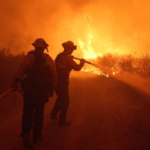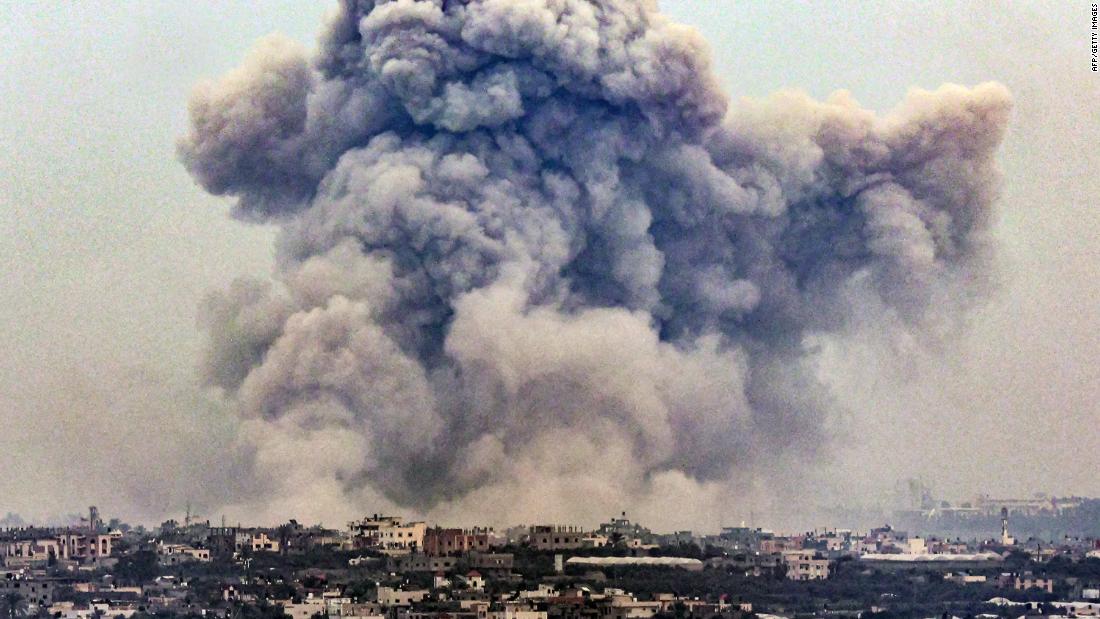Donkey carts crammed with blankets, mattresses piled onto cars and thinly-stocked market stalls lined the mud-caked streets of Nuseirat, in central Gaza, on Thursday, through which streams of displaced people were making their way to the nearby area of Deir al-Balah.
Many had mixed emotions. Deir al-Balah was supposed to be safer, at least according to instructions from the Israeli military, but living conditions were at best primitive.
Generations of Palestinians were camped out among the rubble of flattened buildings, while others carried their belongings to move further south, as the Israeli military expanded its operations in central and southern Gaza.
On Thursday, the Israel Defense Forces issued a new series of evacuation instructions to Palestinians, including that “military activities” would be temporarily suspended in the Al-Brook and Jaffa neighborhoods of Deir al-Balah.
Amnesty International has previously warned that the Israeli military’s calls to evacuate could amount to “forced displacement of the civilian population,” in violation of international law.
The war that began on October 7 has displaced at least 1.93 million people in Gaza, according to the UN Relief and Works Agency for Palestine Refugees (UNRWA). Thousands of families have moved multiple times as Israel’s offensive has moved to new areas.
Several of the civilians who had fled to Deir al-Balah told CNN they were too exhausted to flee again – instead wishing they could return home to “die with dignity.”
Ramzi Al Jammal, a civilian from Al-Bureij refugee camp, was displaced to Al-Aqsa Martyrs Hospital. He has been separated from members of his extended family, including his sons and his grandchildren.
There are no tents, no food, no water, people swarm the storage warehouses, it’s a very difficult situation. I would prefer to die in my house,” Al Jammal said. “I regret leaving my house, I wish we were together so we die together or live together.”
Hundreds of thousands of displaced Palestinians are living in tent camps stretched along cities in the south, with little access to basic sanitation, food, fuel or drinkable water. Many sleep on the streets with inadequate clothing to keep them warm during the winter season.
But Abdul Rahman, a civilian who has not fled Nuseirat, told CNN that trying to survive in makeshift camps was no better than living among the ruins of central and northern Gaza.
“We have no place to go,” he said on Thursday. “There is no space, people sleep on the road. There is no place to sit safely in this area.
“There is no water, there is no electricity,” he said. “They bomb and attack us without any alarm … We have nothing to do, we have no food.”
Abu Adnan, a displaced civilian who now lives on the streets of Deir al-Balah, told CNN he wishes he had “stayed at home and got shot.”
“This is not life, it’s humiliation,” he said. “I will go nowhere after this, unless I go back to my house.”
“I tried to go back home twice but my children pulled me back,” he added. “There are no toilets, no food, no water, no clothes. With all this, I prefer to go back home and die with dignity than dying this way.”
Author Profile
- "Far Left" Bias Rating
- The Cable News Network is a multinational cable news channel headquartered in Atlanta, Georgia, U.S. Founded in 1980 by American media proprietor Ted Turner and Reese Schonfeld as a 24-hour cable news channel.
Latest entries
 HeadlinesAugust 17, 2024A mom with a license plate that reads 'PB4WEGO' wins a battle with the state to keep it
HeadlinesAugust 17, 2024A mom with a license plate that reads 'PB4WEGO' wins a battle with the state to keep it HeadlinesAugust 3, 20243 alleged gang members and an associate charged in the fatal shooting of an off-duty LAPD officer
HeadlinesAugust 3, 20243 alleged gang members and an associate charged in the fatal shooting of an off-duty LAPD officer HeadlinesJuly 16, 2024June 18 2024: US heat wave news
HeadlinesJuly 16, 2024June 18 2024: US heat wave news HeadlinesJuly 11, 2024Jury begins deliberations in Hunter Biden's federal gun trial
HeadlinesJuly 11, 2024Jury begins deliberations in Hunter Biden's federal gun trial

